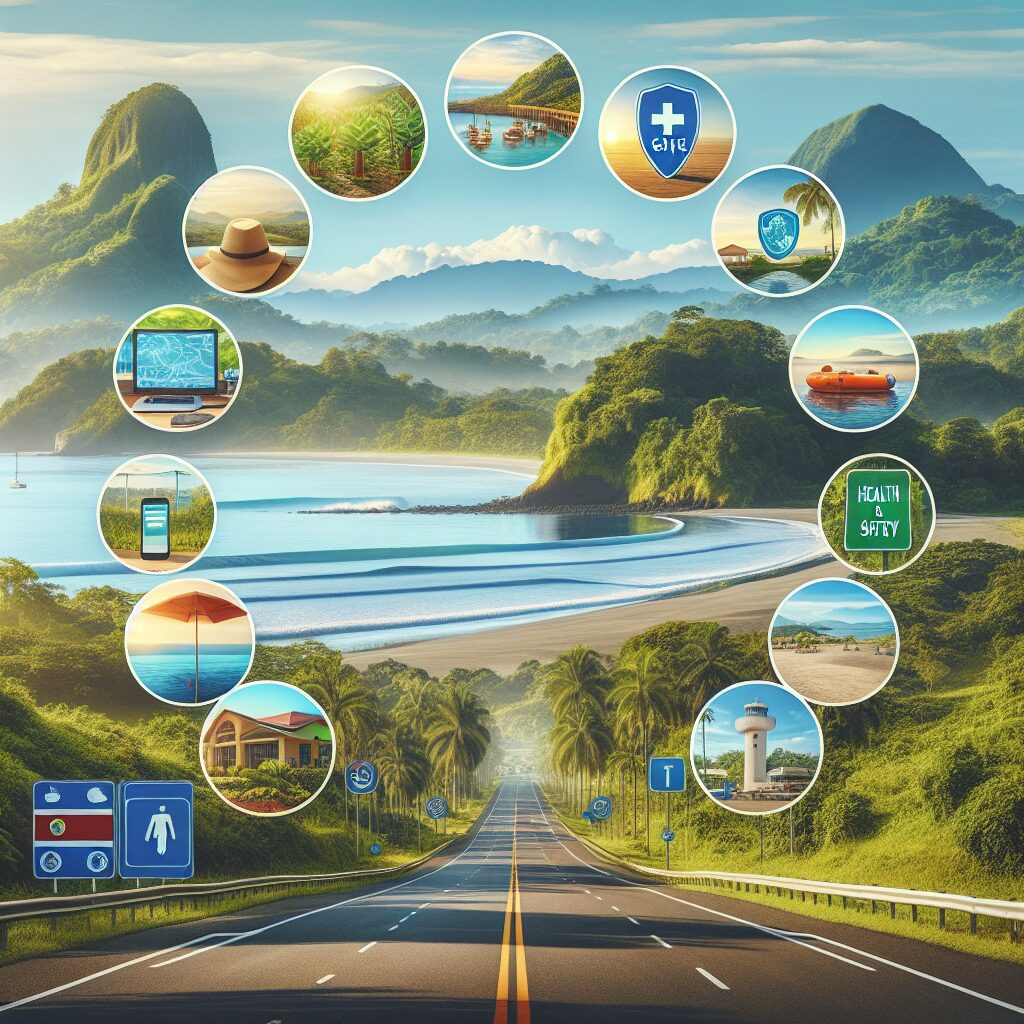Exploring new cultures, landscapes, and experiences solo can be incredibly empowering, especially for women who are seeking a journey of personal growth and independence. Guatemala, with its rich Mayan heritage, vibrant textiles, and breathtaking landscapes that range from lush rainforests to imposing volcanoes, is a destination that often piques the interest of intrepid solo female travelers. Despite its beauty, Guatemala can present unique challenges. Safety is a major concern that floats in the minds of travelers, as the country’s history and current economic conditions have fostered an environment where crime rates are higher than in some other tourist destinations. Female travelers, in particular, need to be well-informed and prepared before embarking on their Guatemalan adventure to ensure a positive experience.
As we delve deeper into the realm of solo female travel within the highlands and lowlands of Guatemala, it’s imperative to highlight the key takeaways that will be discussed in the following sections. Understanding local customs, knowing the safest regions, acquainting oneself with the transportation system, and getting tips on how to blend in are all crucial for a safe and enjoyable journey. After examining the aspects that can shape a solo female traveler’s experience in Guatemala, we will share practical advice and actionable strategies. These insights will serve as a guide to navigating the intricate tapestry of this Central American gem, fostering not only safety but also the freedom to immerse oneself fully in the wonders that Guatemala has to offer.
Essential Insights
1. Crime rates in Guatemala can be high, and solo female travelers are advised to exercise caution, particularly in certain areas. It’s important to be aware of one’s surroundings, avoid walking alone at night, and use trusted transportation services. Petty theft, like pickpocketing, and more serious crimes, such as assault, can happen, particularly in tourist areas and cities like Guatemala City and Antigua.
2. Cultural norms in Guatemala can differ substantially from what female travelers might be accustomed to in their home countries. Understanding and respecting local customs is key, which includes dressing conservatively to avoid unwanted attention and being mindful of the local attitudes towards women, especially in more traditional and rural areas.
3. Using organized tours or established travel groups can enhance safety for solo female travelers in Guatemala. These can offer a sense of security, provide opportunities to meet fellow travelers, and alleviate some of the challenges of navigating unfamiliar environments alone. When traveling between cities or regions, it’s advisable to use reputable shuttle services or experienced travel guides.
4. Emergency preparedness is crucial. Female solo travelers should keep important contact information on hand, such as that of their home country’s embassy or local contacts like hotels and travel agencies. Having access to a phone with a local SIM card to make emergency calls or navigate using GPS can significantly increase safety.
5. Health concerns are relevant for travelers in Guatemala, as food and water safety can be an issue. Solo female travelers should ensure they have comprehensive travel insurance that covers medical expenses. It’s advisable to avoid tap water, have vaccinations up to date, and be cautious with food, particularly from street vendors, to prevent foodborne illnesses.
Can Solo Female Travelers Feel Secure Exploring Guatemala?
Understanding Safety in Guatemala
For the solo female traveler, safety is a multifaceted concept in Guatemala. It encompasses personal security, health concerns, and cultural considerations. Guatemala offers a wealth of cultural experiences, natural beauty, and historical sites. However, like many destinations, it presents certain challenges and risks that must be navigated thoughtfully.
Personal Security Measures
When traveling through Guatemala, personal vigilance is key. Women should be aware of their surroundings, especially in crowded places like markets, bus stations, or during festivals. It’s advisable to avoid walking alone at night or in isolated areas. Utilizing trusted transportation services, rather than public transport, can enhance safety, especially in the evenings.
Health and Well-being
Access to quality healthcare can be a concern in certain parts of Guatemala. Solo female travelers should ensure they have comprehensive travel insurance that covers health emergencies. It’s important to take preventative health measures such as vaccinations, drinking purified water, and protecting against mosquito-borne illnesses.
Accommodation Choices
Selecting the right accommodation is a crucial aspect of travel safety. Many female travelers prioritize staying in reputable hostels or hotels with positive reviews and secure premises, which often include properties that cater specifically to women or offer female-only dorms.
Cultural Sensitivity and Dress
Guatemala is a country with rich traditional values and customs. Female travelers should dress modestly, especially when visiting rural areas or religious sites. Understanding and respecting local customs can not only enhance safety but also enrich the travel experience.
Connecting with Fellow Travelers
One strategy to increase safety is connecting with other travelers through social media groups or platforms designed for solo female travelers. Sharing experiences and tips can provide not only companionship but also shared wisdom on navigating Guatemala’s unique landscape.
Nature and Adventure Activities
For those drawn to outdoor adventures, such as hiking in the highlands or exploring the jungles, it is critical to go with a reputable guide. Ensuring that tours or activities have positive safety records minimizes the risks associated with Guatemala’s natural terrain.
Legal and Emergency Resources
Knowledge is power, and knowing the local emergency numbers, including tourist police contacts in Guatemala, is essential. Solo female travelers should keep this information handy and stay informed about which areas are recommended or discouraged by local authorities.
Staying Informed on Local News
Keeping abreast of the local news can alert travelers to any social or political unrest that could impact safety. This may involve staying connected with your home country’s embassy, which will issue travel advisories or warnings pertinent to Guatemala.
Utilizing Technology for Safety
Technology can be a solo traveler’s best friend. GPS tracking, emergency alert apps, and regular communication with friends or family back home keep you connected and can expedite assistance if needed.
Empowerment Through Language
Even basic proficiency in Spanish or the local indigenous languages can significantly enhance a female traveler’s ability to navigate situations safely. Language skills empower clearer communication and the ability to seek help or information confidently.
What Are the Essential Safety Tips for Solo Female Travelers in Guatemala?
- Always stay aware of your surroundings and trust your instincts regarding personal safety.
- Invest in comprehensive travel insurance that includes health coverage.
- Choose secure accommodation with good reviews, particularly those offering female-friendly options.
- Practice modesty in dress to respect local culture, which can also help avoid unwanted attention.
- Build a network with other solo travelers for support and shared safety advice.
- Engage local, reputable guides for adventure activities and nature exploration.
- Keep updated on the country’s safety situation by following local news and staying in touch with your embassy.
- Leverage safety-related technology such as location tracking and emergency communication apps.
- Learn basic Spanish or local languages to improve your ability to communicate effectively in every situation.
- Have important emergency contact information easily accessible at all times.
What Are the Common Safety Concerns for Solo Female Travelers in Guatemala?
Common safety concerns for solo female travelers in Guatemala include petty theft, like pickpocketing or bag snatching, and more serious crimes such as assaults. It’s advised to stay vigilant, especially in crowded places, avoid isolated areas, and not to travel alone at night.
How Safe Is Public Transportation in Guatemala?
Public transportation in Guatemala varies in safety. City buses are often crowded and can be hotspots for pickpocketing. It’s typically safer to use reputable shuttle services or private transportation when traveling within the country, especially for solo female travelers.
Are There Specific Areas That Solo Female Travelers Should Avoid?
Yes, there are areas in Guatemala that are less safe than others. It is often recommended that solo female travelers avoid Zone 18 and Zone 19 in Guatemala City due to higher crime rates. It’s also wise to steer clear of poorly lit or deserted areas, particularly at night.
Can Solo Female Travelers Easily Find Safe Accommodation?
Solo female travelers can find safe accommodation in Guatemala. It’s advisable to choose well-reviewed hostels or hotels and to book rooms in advance. Many accommodations offer lockers or safes to secure valuables, which add an extra layer of security for travelers.
What Are Recommended Safety Tips for Solo Female Travelers in Guatemala?
Recommended safety tips include avoiding attention by dressing conservatively, keeping valuables out of sight, using a money belt, not walking alone at night, always having a plan for where you’re going, and learning a few phrases in Spanish to communicate in emergencies.
Is Guatemala Safe for Solo Female Travelers at Night?
Caution should be exercised at night. It’s generally safer to avoid being out alone after dark, or to use trusted forms of transportation such as a private taxi or a service like Uber, when moving around at night.
How Can Solo Female Travelers Prepare for Emergencies in Guatemala?
To prepare for emergencies, solo female travelers should have travel insurance, keep emergency contacts on hand, know the location of their country’s embassy or consulate, and have a basic understanding of Spanish or use a translation app to call for help if needed.
Is the Food and Water Safe in Guatemala for Travelers?
Travelers should take care with food and water in Guatemala. It’s best to drink bottled or purified water, avoid raw vegetables, and eat fruits that can be peeled. Eating at reputable restaurants or street food from busy vendors can help avoid food-related illnesses.
What Are the Cultural Norms Regarding Women in Guatemala?
In Guatemala, cultural norms can be more conservative, especially in rural areas. Women are generally expected to dress modestly. Understanding and respecting local customs and traditions is important, as is exercising good judgement in social interactions.
Is It Advisable for Solo Female Travelers to Participate in Local Tours?
Participating in local tours can be a safe and enriching way for solo female travelers to explore Guatemala. It’s recommended to choose tours from reputable companies and to check reviews from other travelers before booking.
Final Thoughts
In conclusion, while Guatemala offers a vibrant culture and breathtaking landscapes, safety remains a significant consideration for solo female travelers. With the proper preparations, awareness of the surroundings, and adherence to safety guidelines, many women have traveled solo throughout Guatemala without incident. It remains crucial, however, to continually evaluate your travel plans, to make informed decisions, and to stay connected with friends, family, or fellow travelers, ensuring not just a memorable but also a secure experience in this beautiful nation.
Remember that every destination has its own set of risks, and personal experiences can vary widely. Trusting your instincts, choosing the right areas to visit, and being informed about the local customs and current political climate can go a long way in making your solo trip to Guatemala both safe and enjoyable.



